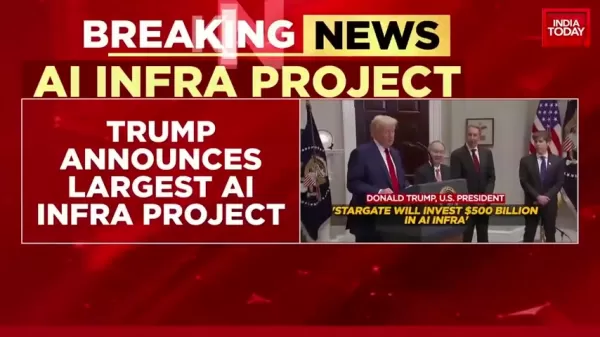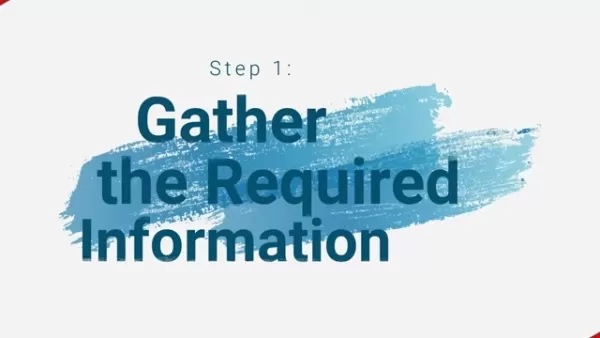Trump's AI Infrastructure Project: A $500BN Investment Analysis
If you're keeping an eye on the world of artificial intelligence, you might have heard about a game-changing announcement: a colossal AI infrastructure project spearheaded by former U.S. President Donald Trump. Dubbed 'Stargate', this initiative is set to pump a whopping $500 billion into enhancing the nation's AI capabilities. It's not just about tech; it's about creating hundreds of thousands of jobs and cementing the U.S. as a global AI powerhouse. Let's dive into what this project entails, its potential impact, and who's backing it.
The Vision Behind 'Stargate'
At the heart of the 'Stargate' project lies a bold vision to transform the U.S.'s AI landscape. Trump's announcement highlights the project's scale and ambition, positioning it as the largest AI endeavor in history. It's not just about technological advancement; it's about job creation and economic growth. By pouring resources into AI infrastructure, the U.S. aims to stay ahead in the global AI race, pushing the boundaries of innovation and tech progress. The name 'Stargate' itself hints at a leap into a new era of AI, suggesting ambitious goals and a forward-thinking approach.

The $500 Billion Investment: Where Will the Money Go?
With a $500 billion investment, the 'Stargate' project is making an unprecedented commitment to AI. Here's how the funds are expected to be used:
- Infrastructure Development: A hefty chunk of the money will go towards building and upgrading the physical infrastructure needed for advanced AI systems. Think data centers, supercomputers, and high-speed networks that can handle AI's computational demands.
- Research and Development: R&D is crucial for pushing AI forward. Funds will support research institutions, universities, and private companies in developing new AI algorithms and machine learning models.
- Workforce Training and Education: To make the most of AI, we need a skilled workforce. The project will invest in training programs and educational initiatives to prepare workers for an AI-driven economy.
- AI-Specific Manufacturing: New manufacturing plants will be built in the U.S. to produce AI-specific equipment, boosting local economies and creating jobs.
- Cybersecurity: As AI grows, so does the need for robust cybersecurity. The project will fund efforts to secure AI systems and infrastructure.
- Public Sector Integration: AI will be integrated into government operations to improve services and efficiency, with investments in training for public sector workers.
By strategically allocating funds, 'Stargate' aims to create a comprehensive AI ecosystem that drives innovation, economic growth, and societal benefits.
The Promise of Hundreds of Thousands of Jobs
One of the most exciting aspects of 'Stargate' is its potential to create hundreds of thousands of jobs. From AI researchers and scientists to engineers, developers, data scientists, and ethicists, the project will open up a wide range of career opportunities. It will also boost manufacturing and production jobs, helping to distribute employment across the U.S. and not just in tech hubs.

Key Players and Supporters of the 'Stargate' Project
The 'Stargate' project has garnered support from some heavy hitters in the tech world:
- Sam Altman (CEO of OpenAI): His endorsement adds credibility to the project's technical feasibility and potential for innovation. Altman's involvement suggests OpenAI could play a significant role in 'Stargate'.

- Masayoshi Son (CEO of SoftBank): Son sees the project as more than just a business opportunity; he believes it will 'help people', emphasizing its potential to improve lives.
- Larry Ellison (Oracle Co-founder): Ellison is enthusiastic about the project's future impact, believing it holds 'an incredible future for all of us'.
These endorsements signal confidence in 'Stargate's vision and potential, which could attract further investment and support.
How the 'Stargate' Project Could Impact Various Sectors
The $500 billion investment in AI infrastructure could revolutionize numerous sectors:
- Healthcare: AI could speed up drug discovery, enhance telemedicine, and provide personalized healthcare based on patient data.
- Finance: AI-powered tools could improve fraud detection, risk assessment, and automate routine tasks, speeding up processes.
- Education: AI can personalize learning, provide instant feedback, and assist students with difficult concepts.
- Manufacturing: AI-driven robots and systems could boost efficiency, reduce errors, and optimize supply chains.
- Transportation: Autonomous vehicles could transform urban transit and logistics, improving safety and reducing congestion.
- Energy: AI algorithms could optimize energy use, predict equipment failures, and integrate renewable energy sources.
These advancements could lead to better services, an improved standard of living, and new economic opportunities for U.S. citizens.
Economic and Geopolitical Implications of Trump's AI Strategy
The 'Stargate' project isn't just a domestic initiative; it has far-reaching economic and geopolitical implications:
- Economic Impact: By investing in AI, the U.S. aims to boost its competitiveness, create new industries, and transform existing ones. This could attract foreign investment and create high-paying jobs.

- Geopolitical Impact: A strong AI ecosystem could enhance national security, help shape global AI standards, and counter China's AI ambitions.
While the project promises economic growth, it could also lead to job displacement in certain sectors, necessitating retraining programs for affected workers.
Advantages and Disadvantages of AI Infrastructure Investment
Pros
- Significant job creation across various sectors.
- Enhanced national security through AI advancements.
- Improved economic competitiveness and innovation.
- Potential for breakthroughs in healthcare, transportation, and other industries.
- Establishment of the U.S. as a global leader in AI.
Cons
- Potential for job displacement due to automation.
- Ethical concerns related to bias, discrimination, and privacy.
- Security risks associated with AI misuse.
- High cost of investment and potential for misallocation of funds.
- Need for significant retraining and education initiatives.
Potential Challenges and Concerns
While 'Stargate' offers many benefits, it also presents challenges:
- Job Displacement: Automation could lead to job losses in certain industries, requiring strategies to mitigate this impact.
- Ethical Concerns: AI algorithms can perpetuate biases if not carefully managed, necessitating ethical guidelines and oversight.
- Security Risks: AI can be misused for malicious purposes, highlighting the need for robust cybersecurity measures.
- Privacy Concerns: AI systems often require vast amounts of data, raising privacy issues that need to be addressed.
Addressing these challenges will require collaboration between governments, businesses, researchers, and civil society to ensure responsible AI development.
The Future of AI: Beyond Infrastructure
The 'Stargate' project is a significant step towards a future where AI is deeply integrated into our lives. We can envision a world with smarter cities, personalized healthcare, autonomous transportation, enhanced education, and new forms of creative expression. However, realizing this vision will require careful planning and a commitment to ethical AI development.
FAQ
What is the 'Stargate' project?
The 'Stargate' project is a $500 billion AI infrastructure initiative announced by former U.S. President Donald Trump. It aims to enhance the U.S.'s AI capabilities, create hundreds of thousands of jobs, and position the country as a leader in AI technology, with support from tech giants and influential figures like Sam Altman and Masayoshi Son.
How will the $500 billion investment be allocated?
The investment will be channeled into areas such as infrastructure development, research and development, workforce training and education, AI-specific manufacturing, cybersecurity, and public sector integration.
What types of jobs are expected to be created by the project?
The project is expected to create jobs for AI researchers, scientists, engineers, developers, data scientists, and ethicists, contributing to the growth and competitiveness of the U.S. economy.
What are the economic and geopolitical implications of this project?
Economically, the project could boost U.S. competitiveness, create new industries, and transform existing ones. Geopolitically, it aims to enhance national security, shape global AI standards, and counter China's AI ambitions.
What are the potential challenges and concerns associated with the project?
Potential challenges include job displacement due to automation, ethical concerns related to bias and discrimination, security risks associated with AI misuse, and privacy concerns related to data collection and use.
Related Questions
How can individuals prepare for the AI-driven economy?
To prepare for an AI-driven economy, individuals should focus on developing skills in high demand, such as data science, AI engineering, and AI ethics. Lifelong learning and adaptability to new technologies are crucial. Seeking out courses and training programs focused on AI can be beneficial.
What role should governments play in regulating AI?
Governments should regulate AI to ensure responsible and ethical development and use. This includes setting guidelines for data privacy, preventing bias and discrimination, ensuring AI safety and security, and investing in research and education to support AI development and mitigate risks.
What are the potential benefits of AI in healthcare?
AI can transform healthcare by improving diagnosis, treatment, and prevention. It can analyze medical images, predict patient outcomes, personalize treatment plans, automate administrative tasks, and assist with drug development and genetic analysis.
How can AI be used to address climate change?
AI can help address climate change by optimizing energy consumption, predicting extreme weather events, developing new materials and technologies, improving renewable energy efficiency, and modeling large public works to mitigate global warming effects.
Related article
 AI-Powered Cover Letters: Expert Guide for Journal Submissions
In today's competitive academic publishing environment, crafting an effective cover letter can make the crucial difference in your manuscript's acceptance. Discover how AI-powered tools like ChatGPT can streamline this essential task, helping you cre
AI-Powered Cover Letters: Expert Guide for Journal Submissions
In today's competitive academic publishing environment, crafting an effective cover letter can make the crucial difference in your manuscript's acceptance. Discover how AI-powered tools like ChatGPT can streamline this essential task, helping you cre
 US to Sanction Foreign Officials Over Social Media Regulations
US Takes Stand Against Global Digital Content Regulations
The State Department issued a sharp diplomatic rebuke this week targeting European digital governance policies, signaling escalating tensions over control of online platforms. Secretary Marco
US to Sanction Foreign Officials Over Social Media Regulations
US Takes Stand Against Global Digital Content Regulations
The State Department issued a sharp diplomatic rebuke this week targeting European digital governance policies, signaling escalating tensions over control of online platforms. Secretary Marco
 Ultimate Guide to AI-Powered YouTube Video Summarizers
In our information-rich digital landscape, AI-powered YouTube video summarizers have become indispensable for efficient content consumption. This in-depth guide explores how to build a sophisticated summarization tool using cutting-edge NLP technolog
Comments (2)
0/200
Ultimate Guide to AI-Powered YouTube Video Summarizers
In our information-rich digital landscape, AI-powered YouTube video summarizers have become indispensable for efficient content consumption. This in-depth guide explores how to build a sophisticated summarization tool using cutting-edge NLP technolog
Comments (2)
0/200
![JackRoberts]() JackRoberts
JackRoberts
 August 20, 2025 at 9:01:18 AM EDT
August 20, 2025 at 9:01:18 AM EDT
This $500B Stargate project sounds wild! 🚀 Trump’s diving into AI like it’s the new space race. I’m curious if it’ll really boost the US or just be another hyped-up plan that fizzles out. Anyone else wondering how they’ll pull this off?


 0
0
![RichardHarris]() RichardHarris
RichardHarris
 July 30, 2025 at 9:41:20 PM EDT
July 30, 2025 at 9:41:20 PM EDT
Whoa, $500B for an AI project? That’s like betting the farm on a sci-fi future! Curious if Stargate will actually revolutionize AI or just be a flashy money pit. 🤔


 0
0
If you're keeping an eye on the world of artificial intelligence, you might have heard about a game-changing announcement: a colossal AI infrastructure project spearheaded by former U.S. President Donald Trump. Dubbed 'Stargate', this initiative is set to pump a whopping $500 billion into enhancing the nation's AI capabilities. It's not just about tech; it's about creating hundreds of thousands of jobs and cementing the U.S. as a global AI powerhouse. Let's dive into what this project entails, its potential impact, and who's backing it.
The Vision Behind 'Stargate'
At the heart of the 'Stargate' project lies a bold vision to transform the U.S.'s AI landscape. Trump's announcement highlights the project's scale and ambition, positioning it as the largest AI endeavor in history. It's not just about technological advancement; it's about job creation and economic growth. By pouring resources into AI infrastructure, the U.S. aims to stay ahead in the global AI race, pushing the boundaries of innovation and tech progress. The name 'Stargate' itself hints at a leap into a new era of AI, suggesting ambitious goals and a forward-thinking approach.

The $500 Billion Investment: Where Will the Money Go?
With a $500 billion investment, the 'Stargate' project is making an unprecedented commitment to AI. Here's how the funds are expected to be used:
- Infrastructure Development: A hefty chunk of the money will go towards building and upgrading the physical infrastructure needed for advanced AI systems. Think data centers, supercomputers, and high-speed networks that can handle AI's computational demands.
- Research and Development: R&D is crucial for pushing AI forward. Funds will support research institutions, universities, and private companies in developing new AI algorithms and machine learning models.
- Workforce Training and Education: To make the most of AI, we need a skilled workforce. The project will invest in training programs and educational initiatives to prepare workers for an AI-driven economy.
- AI-Specific Manufacturing: New manufacturing plants will be built in the U.S. to produce AI-specific equipment, boosting local economies and creating jobs.
- Cybersecurity: As AI grows, so does the need for robust cybersecurity. The project will fund efforts to secure AI systems and infrastructure.
- Public Sector Integration: AI will be integrated into government operations to improve services and efficiency, with investments in training for public sector workers.
By strategically allocating funds, 'Stargate' aims to create a comprehensive AI ecosystem that drives innovation, economic growth, and societal benefits.
The Promise of Hundreds of Thousands of Jobs
One of the most exciting aspects of 'Stargate' is its potential to create hundreds of thousands of jobs. From AI researchers and scientists to engineers, developers, data scientists, and ethicists, the project will open up a wide range of career opportunities. It will also boost manufacturing and production jobs, helping to distribute employment across the U.S. and not just in tech hubs.

Key Players and Supporters of the 'Stargate' Project
The 'Stargate' project has garnered support from some heavy hitters in the tech world:
- Sam Altman (CEO of OpenAI): His endorsement adds credibility to the project's technical feasibility and potential for innovation. Altman's involvement suggests OpenAI could play a significant role in 'Stargate'.
- Masayoshi Son (CEO of SoftBank): Son sees the project as more than just a business opportunity; he believes it will 'help people', emphasizing its potential to improve lives.
- Larry Ellison (Oracle Co-founder): Ellison is enthusiastic about the project's future impact, believing it holds 'an incredible future for all of us'.

These endorsements signal confidence in 'Stargate's vision and potential, which could attract further investment and support.
How the 'Stargate' Project Could Impact Various Sectors
The $500 billion investment in AI infrastructure could revolutionize numerous sectors:
- Healthcare: AI could speed up drug discovery, enhance telemedicine, and provide personalized healthcare based on patient data.
- Finance: AI-powered tools could improve fraud detection, risk assessment, and automate routine tasks, speeding up processes.
- Education: AI can personalize learning, provide instant feedback, and assist students with difficult concepts.
- Manufacturing: AI-driven robots and systems could boost efficiency, reduce errors, and optimize supply chains.
- Transportation: Autonomous vehicles could transform urban transit and logistics, improving safety and reducing congestion.
- Energy: AI algorithms could optimize energy use, predict equipment failures, and integrate renewable energy sources.
These advancements could lead to better services, an improved standard of living, and new economic opportunities for U.S. citizens.
Economic and Geopolitical Implications of Trump's AI Strategy
The 'Stargate' project isn't just a domestic initiative; it has far-reaching economic and geopolitical implications:
- Economic Impact: By investing in AI, the U.S. aims to boost its competitiveness, create new industries, and transform existing ones. This could attract foreign investment and create high-paying jobs.
- Geopolitical Impact: A strong AI ecosystem could enhance national security, help shape global AI standards, and counter China's AI ambitions.

While the project promises economic growth, it could also lead to job displacement in certain sectors, necessitating retraining programs for affected workers.
Advantages and Disadvantages of AI Infrastructure Investment
Pros
- Significant job creation across various sectors.
- Enhanced national security through AI advancements.
- Improved economic competitiveness and innovation.
- Potential for breakthroughs in healthcare, transportation, and other industries.
- Establishment of the U.S. as a global leader in AI.
Cons
- Potential for job displacement due to automation.
- Ethical concerns related to bias, discrimination, and privacy.
- Security risks associated with AI misuse.
- High cost of investment and potential for misallocation of funds.
- Need for significant retraining and education initiatives.
Potential Challenges and Concerns
While 'Stargate' offers many benefits, it also presents challenges:
- Job Displacement: Automation could lead to job losses in certain industries, requiring strategies to mitigate this impact.
- Ethical Concerns: AI algorithms can perpetuate biases if not carefully managed, necessitating ethical guidelines and oversight.
- Security Risks: AI can be misused for malicious purposes, highlighting the need for robust cybersecurity measures.
- Privacy Concerns: AI systems often require vast amounts of data, raising privacy issues that need to be addressed.
Addressing these challenges will require collaboration between governments, businesses, researchers, and civil society to ensure responsible AI development.
The Future of AI: Beyond Infrastructure
The 'Stargate' project is a significant step towards a future where AI is deeply integrated into our lives. We can envision a world with smarter cities, personalized healthcare, autonomous transportation, enhanced education, and new forms of creative expression. However, realizing this vision will require careful planning and a commitment to ethical AI development.
FAQ
What is the 'Stargate' project?
The 'Stargate' project is a $500 billion AI infrastructure initiative announced by former U.S. President Donald Trump. It aims to enhance the U.S.'s AI capabilities, create hundreds of thousands of jobs, and position the country as a leader in AI technology, with support from tech giants and influential figures like Sam Altman and Masayoshi Son.
How will the $500 billion investment be allocated?
The investment will be channeled into areas such as infrastructure development, research and development, workforce training and education, AI-specific manufacturing, cybersecurity, and public sector integration.
What types of jobs are expected to be created by the project?
The project is expected to create jobs for AI researchers, scientists, engineers, developers, data scientists, and ethicists, contributing to the growth and competitiveness of the U.S. economy.
What are the economic and geopolitical implications of this project?
Economically, the project could boost U.S. competitiveness, create new industries, and transform existing ones. Geopolitically, it aims to enhance national security, shape global AI standards, and counter China's AI ambitions.
What are the potential challenges and concerns associated with the project?
Potential challenges include job displacement due to automation, ethical concerns related to bias and discrimination, security risks associated with AI misuse, and privacy concerns related to data collection and use.
Related Questions
How can individuals prepare for the AI-driven economy?
To prepare for an AI-driven economy, individuals should focus on developing skills in high demand, such as data science, AI engineering, and AI ethics. Lifelong learning and adaptability to new technologies are crucial. Seeking out courses and training programs focused on AI can be beneficial.
What role should governments play in regulating AI?
Governments should regulate AI to ensure responsible and ethical development and use. This includes setting guidelines for data privacy, preventing bias and discrimination, ensuring AI safety and security, and investing in research and education to support AI development and mitigate risks.
What are the potential benefits of AI in healthcare?
AI can transform healthcare by improving diagnosis, treatment, and prevention. It can analyze medical images, predict patient outcomes, personalize treatment plans, automate administrative tasks, and assist with drug development and genetic analysis.
How can AI be used to address climate change?
AI can help address climate change by optimizing energy consumption, predicting extreme weather events, developing new materials and technologies, improving renewable energy efficiency, and modeling large public works to mitigate global warming effects.
 AI-Powered Cover Letters: Expert Guide for Journal Submissions
In today's competitive academic publishing environment, crafting an effective cover letter can make the crucial difference in your manuscript's acceptance. Discover how AI-powered tools like ChatGPT can streamline this essential task, helping you cre
AI-Powered Cover Letters: Expert Guide for Journal Submissions
In today's competitive academic publishing environment, crafting an effective cover letter can make the crucial difference in your manuscript's acceptance. Discover how AI-powered tools like ChatGPT can streamline this essential task, helping you cre
 US to Sanction Foreign Officials Over Social Media Regulations
US Takes Stand Against Global Digital Content Regulations
The State Department issued a sharp diplomatic rebuke this week targeting European digital governance policies, signaling escalating tensions over control of online platforms. Secretary Marco
US to Sanction Foreign Officials Over Social Media Regulations
US Takes Stand Against Global Digital Content Regulations
The State Department issued a sharp diplomatic rebuke this week targeting European digital governance policies, signaling escalating tensions over control of online platforms. Secretary Marco
 Ultimate Guide to AI-Powered YouTube Video Summarizers
In our information-rich digital landscape, AI-powered YouTube video summarizers have become indispensable for efficient content consumption. This in-depth guide explores how to build a sophisticated summarization tool using cutting-edge NLP technolog
Ultimate Guide to AI-Powered YouTube Video Summarizers
In our information-rich digital landscape, AI-powered YouTube video summarizers have become indispensable for efficient content consumption. This in-depth guide explores how to build a sophisticated summarization tool using cutting-edge NLP technolog
 August 20, 2025 at 9:01:18 AM EDT
August 20, 2025 at 9:01:18 AM EDT
This $500B Stargate project sounds wild! 🚀 Trump’s diving into AI like it’s the new space race. I’m curious if it’ll really boost the US or just be another hyped-up plan that fizzles out. Anyone else wondering how they’ll pull this off?


 0
0
 July 30, 2025 at 9:41:20 PM EDT
July 30, 2025 at 9:41:20 PM EDT
Whoa, $500B for an AI project? That’s like betting the farm on a sci-fi future! Curious if Stargate will actually revolutionize AI or just be a flashy money pit. 🤔


 0
0





























